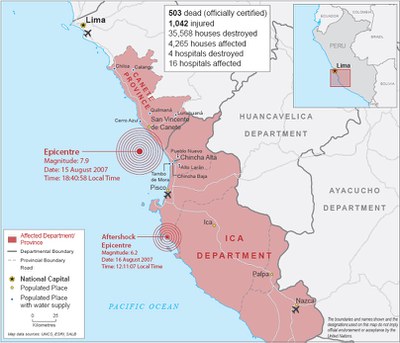Ica Earthquake
Context: Earthquake
Start date: 16/08/2007
End date: 20/09/2007
Areas of intervention: 3 cities
- Pisco
- Chincha
- Ica
Activities:
- Telecoms assessments
- UNDAC support
- Telecoms centres
- Humanitarian calling operations
- Capacity building
4 telecom centres
3,787 MB of data exchanged
100 hours of communication offered
3,600 family beneficiaries
42 NGOs and institutions supported
Context
An earthquake measuring 7.9 on the Richter scale hit the Ica Department in Peru on 15th August 2007 at 18:40 local time. According to the National Institute of Civil Defence (INDECI), 519 people lost their lives and 1,366 were injured. 58,581 homes were destroyed, 103 hospitals were affected, 14 of which were completely demolished, and the telecommunications infrastructure was also seriously damaged.

Communications were rendered difficult and sometimes impossible due to the damages. The needs for telephony and information transmission (reports, initial assessments, etc.) were essential for the coordination of services.
Deployment
The UN Office for the Coordination of Humanitarian Affairs (OCHA) requested that Télécoms Sans Frontières provide support to the UN Disaster Assessment and Coordination (UNDAC) teams in the field.
Less than 24 hours after the earthquake, TSF deployed a team from its Americas base to support relief agencies and the affected population. On 16th August at 6am, the team landed at Lima airport where they met with the International Federation of Red Cross. The next day, the team reached the city of Pisco via the air bridge organised by the Peruvian Army. Pisco was the coordinating point for TSF assessments and operations in the provinces of Ica and Chincha.
Telecoms assessments
The telecommunication situation evolves rapidly during the emergency phase following a disaster. In collaboration with UNDAC, TSF adapted its response based on evaluations in the Ica, Chincha and Huancavelica regions.
Mobile networks were operative in most of the affected areas but remained unstable and often saturated, while fixed telephony and Internet were not functional. Damage and needs assessments sent from the field were transmitted either by mobile phone calls or satellite connection; the transmission of written reports were impossible. The major problem remained the lack of power preventing people from recharging their phones’ batteries. Therefore, vehicle batteries were used for emergency recharge.
Telecom centres
It was first essential to equip the Pisco-based INDECI logistics and coordination platform with emergency telecommunications and computer tools to process the assessments. In partnership with the European Civil Protection and Humanitarian Aid Operations (ECHO), TSF set up two telecom centres on the Pisco military base providing telecommunication equipment and technical support to:
- The Comando Operativo de Emergencias (COE) led by the National Institute of Civil Defence of Peru (INDECI) from 17th to 28th August;
- UNDAC's Field Operations Coordination Centre (OSOCC), open to all humanitarian actors from 19th August to 10th September. The OSOCC was later replaced by a national coordination centre which was maintained until December. TSF installed the centre and ensured technical assistance until 18th September.
With an average number of 30 to 40 daily users, these centres enabled aid agencies to better coordinate their operations on the ground and send assessments and reports on the situation to enable relief workers to respond more efficiently to the needs of the affected populations.
From 26th August to 10th September, TSF installed, at the request of the UN Office for Project Services (UNOPS), a satellite connection at the Port of Pejerrey for the registration of non-food items (NFIs) and their transfers between the different warehouses. From 27th August to 5th September, TSF installed, at the request of COOPI, a satellite connection with Wi-Fi access in their offices in the province of Chincha.
"The knowledge and professionalism of TSF’s team was highly valuable to the United Nations and to the Peruvian government’s disaster response. TSF’s rapid response in establishing priority communications was crucial to provide immediate assistance to the survivors of the earthquake. On behalf of the United Nations, I wish to thank TSF for their great support,” testified Jorge L. Chediek, the UN Resident Coordinator in Peru.
On 10th September, GSM, landline and Internet networks were operational and electricity was also re-established. TSF transferred the satellite connections in its centres to local network operators.
Humanitarian calling operations
In parallel, TSF also directly supported affected Peruvians by conducting humanitarian calling operations to enable survivors to ask their family for personal help, organise money transfers or simply say, "I'm alive".
From 18th to 24th August, two mobile teams offered national and international calls to the population. First in seven shelters across Pisco with an average of 150 to 200 calls per day. Rapidly, cybercafés and telephone networks were available to the population. No needs were identified for the population of Ica, Chincha and Huancavelica; the telecoms sector was able to cope with the situation and had restored services quickly.
Capacity building
On 30th August, a senior official of the International Telecommunication Union (ITU) contacted TSF while in the field to request technical expertise for the activation of 50 satellite modems. This equipment was provided to the various Peruvian emergency actors and to town halls and public institutions that TSF trained for two days in Lima.
After covering the emergency phase and ensuring access to reliable means of communication for the rehabilitation and reconstruction phases, TSF's mission ended on 20th September.

























